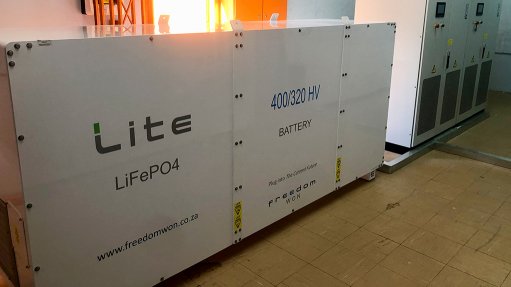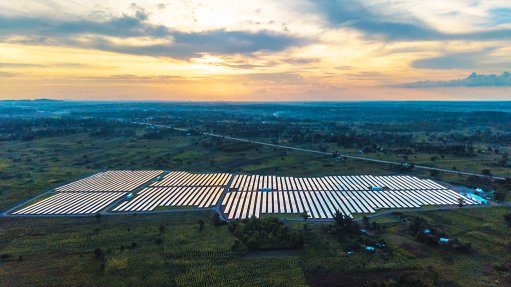Unmanned aircraft industry welcomes new regulations, with caveats
While strongly welcoming the promulgation of the new Part 101 of South Africa’s civil aviation regulations, governing the commercial operation of civil remotely piloted aircraft (RPAs) in South Africa, the Commercial Unmanned Aircraft Association of Southern Africa (Cuaasa) still has some significant reservations. The regulations will be implemented by the South African Civil Aviation Authority (SACAA).
“We’re very glad that the Minister has finally signed [Part 101] and that we have a date it’ll come into full effect – July 1,” says Cuaasa president Hennie Kieser. “Our concern is that we know the regulator is in no position to implement these regulations and that they are totally, totally, overregulating.
“RPAs are a great opportunity for South Africa but the SACAA regulations will make it very difficult for young entrepreneurs to enter the sector,” he highlights. “The transformation of the aviation industry in the country is essential and the SACAA is going to kill it.
“The next major issue we have – we want to grow the manufacturing industry in South Africa. We can’t have the SACAA stifling the industry,” he affirms. “There is an opportunity to manufacture locally, but this is only possible if there is a local market for RPAs. We need the regulator to support the local industry, not hamper it. No one will invest in the sector if the regulator is seen to be against the industry.”
Thus, the SACAA wants to treat even small RPAs in the same way as manned aircraft, in terms of requiring them to have registrations. But assigning aircraft registrations takes time and there is a clear risk that adding RPAs to the queue would overload the system. Further, unlike manned aircraft, RPAs are often upgraded incrementally – at what point would an upgraded RPA have to be regarded as a new aircraft and reregistered as such? Finally, wrecked RPAs, unlike wrecked manned aircraft, are usually just thrown away. Could the SACAA’s system handle this? There are currently no answers to these questions.
Moreover, the SACAA charges applicants for processing their documents. The authority assures that it will process RPA registration documents within two months. But the fee will be R600/h. This could easily be exorbitant, for a small entrepreneur. The cost of a Cuaasa RPA licence is likely to be between R5 000 and R10 000 (the category of RPAs most likely to be used by small operators currently have a capital cost of about R20 000 each).
Other countries do not require RPA pilots to have licences. Rather, the UK, for example, requires them to demonstrate their competence (by passing a ground exam and a flying test). “We recommended to the SACAA that the way to achieve safety would be to have the pilots come and demonstrate their capability, not to get a piece of paper. This would also be easier to enforce,” he states. “Our opinion is that the licence will be easy to pass but will not establish piloting capability.”
Cuaasa also fears that the SACAA has an unsympathetic attitude to RPAs. Thus, while Part 101 allows for night flying of RPAs, there have been indications that the authority will not grant any applications to do so, despite the fact that night time is actually the safest time to fly RPAs (very few light manned aircraft, or for that matter, birds, fly at night) and the most useful time, as well – much serious crime, such as cable theft and poaching, happens during the nocturnal hours.
The local industry feels that the regulator must allow more self-regulation in the industry. The fact is that a single bad RPA pilot could kill an entire company and damage the entire sector, so self-regulation would be seriously enforced. “This is what Europe and a lot of other countries are doing,” he observes.
“At some point, the SACAA themselves will realise that they can’t enforce all the regulations,” concludes Kieser. “When this happens we’ll work with the regulator to amend Part 101 to end the situation of overregulation.”
Comments
Announcements
What's On
Subscribe to improve your user experience...
Option 1 (equivalent of R125 a month):
Receive a weekly copy of Creamer Media's Engineering News & Mining Weekly magazine
(print copy for those in South Africa and e-magazine for those outside of South Africa)
Receive daily email newsletters
Access to full search results
Access archive of magazine back copies
Access to Projects in Progress
Access to ONE Research Report of your choice in PDF format
Option 2 (equivalent of R375 a month):
All benefits from Option 1
PLUS
Access to Creamer Media's Research Channel Africa for ALL Research Reports, in PDF format, on various industrial and mining sectors
including Electricity; Water; Energy Transition; Hydrogen; Roads, Rail and Ports; Coal; Gold; Platinum; Battery Metals; etc.
Already a subscriber?
Forgotten your password?
Receive weekly copy of Creamer Media's Engineering News & Mining Weekly magazine (print copy for those in South Africa and e-magazine for those outside of South Africa)
➕
Recieve daily email newsletters
➕
Access to full search results
➕
Access archive of magazine back copies
➕
Access to Projects in Progress
➕
Access to ONE Research Report of your choice in PDF format
RESEARCH CHANNEL AFRICA
R4500 (equivalent of R375 a month)
SUBSCRIBEAll benefits from Option 1
➕
Access to Creamer Media's Research Channel Africa for ALL Research Reports on various industrial and mining sectors, in PDF format, including on:
Electricity
➕
Water
➕
Energy Transition
➕
Hydrogen
➕
Roads, Rail and Ports
➕
Coal
➕
Gold
➕
Platinum
➕
Battery Metals
➕
etc.
Receive all benefits from Option 1 or Option 2 delivered to numerous people at your company
➕
Multiple User names and Passwords for simultaneous log-ins
➕
Intranet integration access to all in your organisation


















